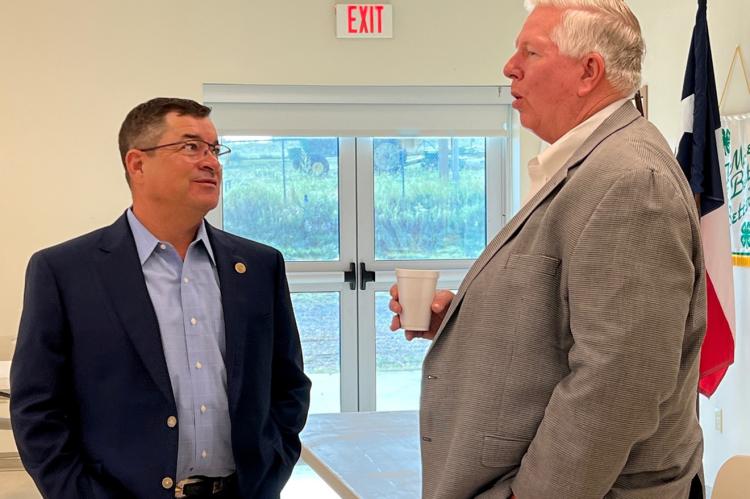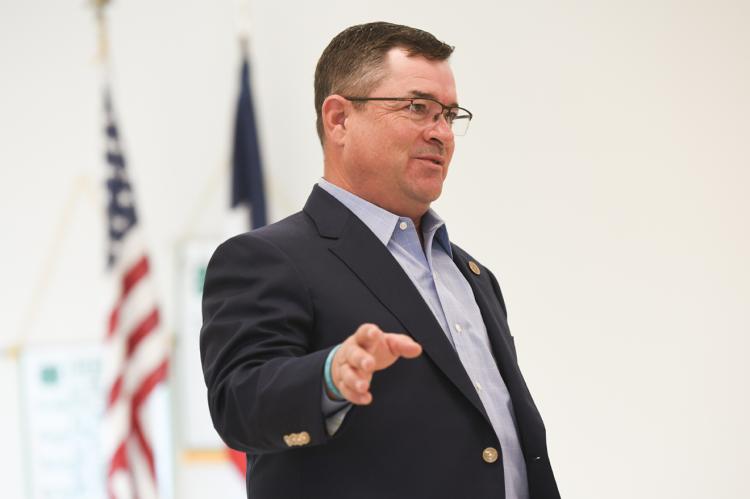In town hall meeting, state Rep. Ken King focuses on education, school safety, and vouchers
State Rep. Ken King (R) launched his pre-88th Legislature tour through District 88 here in Canadian on Tuesday, speaking to a small group of about 20 at the Hemphill County Exhibition Center.
“We talk a lot about the national news,” King said in his opening comments. “The fact of the matter is what the state does for you, and to you, affects your daily life a lot more than what’s going on in D.C.—at least in the short term.”
“So it’s nice to see some interest in it,” he said. Despite the disappointing turnout, it was a good chance for King to shake off the rust of a summer spent mostly on the ranch and to try out his pre-session speech, which he admitted is a little tougher than the post-session one.
“I have to tell you about all of my hopes and dreams,” he said. “Ninety percent of them are going to get crushed.”
As King always reminds his constituents, the top two priorities for the state’s lawmakers are both constitutional requirements, and he takes them seriously. “We have to balance a budget in 140 days, and we have to pay for public education. That’s the only thing that’s required of the Legislature.”
This year, those requirements may be a little bit easier, though, following Comptroller Glenn Hegar’s announcement that the state is beginning the year with at least a $26 billion surplus, which may well be closer to $30 billion.
“That creates a whole new set of problems,” King said. “It’s always easier when you’re broke because you can tell everybody ‘No,’ and everybody understands.”
“But when you’ve got $30 billion in surplus money, and you have 181 elected officials serving 254 counties, 1,200 school districts, and healthcare and water and prisons and everything else, there’s no shortage of where to spend $30 billion extra dollars.”
With the 14th largest economy in the world, he said, there’s no shortage of priorities. First on King’s list, though, is public education. “I’ve been on the Public Ed Committee since 2013,” he said. “There’s nothing more important that the state does, in my opinion. You’re talking about the two greatest resources we have in Texas: our children and our money. Most of the budget goes to public education, and most of the people—that’s what they care about.”
While the focus on education is to be expected, this legislative session may be different, coming as it does on the heels of the Uvalde tragedy. On May 24, an 18-year-old with an AR-15 entered Uvalde’s Robb Elementary and opened fire on children and teachers in two connected classrooms. Nineteen students and two teachers died. Many others sustained traumatic injuries—physical, emotional, and psychological.
School safety, he said, is going to suck a lot of oxygen out of that room.
Just four years and six days earlier, a 17-year-old gunman opened fire inside Santa Fe High School and, within less than 30 minutes, killed eight students and two teachers. After that shooting, King said, “the Legislature acted as directed by citizens and Texas…and some of what we did was good. Some of it got adopted by school districts, and some of it got ignored.”
“You know how things are,” he said. “Tragedies happen, and then once it’s out of sight, it’s out of mind.”
COVID happened, and during the pandemic, there was no school.
“We forgot everything,” King said. “School shootings didn’t happen. Nobody died of cancer or heart disease because everybody was dying of COVID. That’s what happened to the school safety program after 2019. It just kind of got put on the shelf.”
Uvalde shone a huge light on the issue of school safety again, he said, and raised a lot of other issues.
“One of the main things, I think, is Texas has gotten relaxed about truancy laws, to where they don’t exist,” King said, pointing out that the Uvalde shooter had been truant for two years. “As a state, we don’t require accountability of our public school systems. We talked about mental health and how somebody at the school should have known, but a superintendent isn’t even allowed to ask why the kid didn’t come to school. That’s wrong.”
King talked about hardening schools and what that might require, whether it be panic buttons or metal detectors, fences and razor wire, armed guards, or more guns on campus. “I think it could be all of those things,” he said.
He also cited several other problems in public schools that must be addressed: shortages of teachers, as well as other staff like librarians and counselors—even bus drivers.
“I’m always looking for ways to help retain and recruit quality teachers,” King said. “Everybody in the education world—that is the one thing they can agree on. A child’s success depends on reading at grade level by third grade. And that success depends on a high-quality teacher, whether you have all the computers in the world and all the advantages—rich, poor, whatever—that high-quality teacher is most important to a child’s success.”
Another big issue facing the Legislature is school vouchers. “We have a speaker that wants to talk about infrastructure,” King said, “and who feels like we had a social justice session last time. But Lt. Gov. [Dan Patrick] wants another social justice war.”
“There’s been a war waged on our public school system,” Rep. King said, referring to a book titled Gender Queer: A Memoir that was found in the Keller ISD library. “We have some political figures who want to burn books, and honestly, I don’t want to see a book like Gender Queer in my public library, or where our kids can get a hold of it, but I’m not sure that burning books is the way to go.”
King also made it clear he would never vote for school vouchers, or what is now called “parental choice.”
Vouchers, he said, take public dollars to give to private institutions to educate our kids. “No. 1, it’s a bad idea because we fund public schools based on population—it’s price per head. Rural schools get the least funding because we have the least amount of kids. When you take money out of the system, our schools get hit first.”
“No. 2, the two places these charter schools, private schools, magnet schools do not go is rural Texas, and they don’t go to the inner cities,” he said. “They can’t make any money there.
So, take money out of the system, but it still doesn’t help our kids.”
The third reason, King said, is because the voucher follows the student, but if the student gets kicked out of the private school, the public school still has an obligation to take him back—but without the money. “That’s a pretty good reason not to do this.”
King’s final argument is that proponents of vouchers want to give money to people to educate their kids however they want. “Now, I get it in principle,” he said, “but what about the parents that want their kid to learn Sharia law? Or the parent that wants a school that teaches homosexuality is mainstream?”
“That is your tax dollars doing this, with no oversight,” he said. “The taxpayer is not going to know where your tax dollars went or what kind of education you got.”
“For all of those reasons, and many more,” he said, “I will not be supporting the school voucher system. Our school choice is to make our public schools the best they can possibly be. I’ve always felt that way, and I still do.”
King also noted a few other key issues the 88th Legislature will be addressing when its next session begins on Jan. 10, 2023:
INFRASTRUCTURE IMPROVEMENT: King said House Speaker Dade Phelan is committed to having an infrastructure session, addressing Texas’ schools, roads, and bridges. That, too, ties back into school safety, he said. “Not all of our buildings were built in the last century, so trying to put today’s technology into those buildings without some significant funding is just an impossibility.”
APPRAISAL REFORM: Another priority, King said, is appraisal reform. “We’ve been down the road of capping local taxing entities on what they can raise your property taxes to, but we haven’t changed an antiquated appraisal system. Until we do that, you’re never going to see true property tax relief.”
Capping local property tax rates, he said, ties the hands of locally elected officials. “I am excited about taking on the challenge of appraising property values in Hemphill County differently than we do Travis County,” King said. “Austin’s property tax values have gone up about 400 percent for the last 10 years. Our values have not. We should not be taxed at the same level or at the same rate.”
TEXAS' POWER GRID: “We had Winter Storm Uri and came within minutes of losing our power grid,” King said. “Had we lost it, nobody knows what would have happened, because it’s never been shut off. There was some testimony last session that places like Dallas could have been out of electricity for a year. Nobody knows how to light the candle if it ever goes out.”
“The power grid is still not stable,” he said. “We’re fortunate up here [that] we’re not part of ERCOT (Electric Reliability Council of Texas), which represents about 75 percent of electricity in Texas.
It was truly a perfect storm. We had six power plants in Texas that feed ERCOT that were offline for maintenance, which is nuts.”
“The weatherman had been telling us for two weeks that this was coming. Now, I get it. You know, the weatherman is the only job you get paid to be wrong. But when that many were saying it, we should have paid attention, and Texas did not prepare.”
A lot of the natural gas compression feeds for ERCOT come out of the Permian Basin, King explained. They no longer compress natural gas to go down the pipeline with natural gas compressors. They compress them with electric compressors. “So, when Dallas, Houston, San Antonio, and Austin were all losing power,” he said, “they had to steal power from somewhere. ‘There’s nobody who lives in West Texas. Let’s just shut it off.’” King said there are a lot of factors that caused the disaster, and a lot of those things were fixed. “But we have not fixed our capability to generate more power in the state of Texas. Some estimates say that in the next 20 years, we’ll have 50 million people, and we have the same power grid we’ve had since 1993. I think the electric grid and power generation needs to be a priority that is looked at.”
ABOUT KEN KING
When the 88th legislative session begins next January, it will be Canadian-native Ken King’s sixth session as District 88 state representative, which now includes 19 counties in the Panhandle and South Plains of Texas. He currently serves as chairman of the House Culture, Recreation, and Tourism Committee and is a member of the House Public Education Committee and the Energy Council. King is also a member of the House Research Organization board of directors. Prior to his election to the Texas House of Representatives, King served as a Canadian ISD school trustee for five years—nearly half of that as president. That explains his passion for public education and his particular concern for rural school districts and the special challenges they face. His interest in the state’s public schools has been at the top of his agenda since he was first elected in 2013 and has not wavered since.
PHOTO BY LAURIE EZZELL BROWN | THE RECORD



